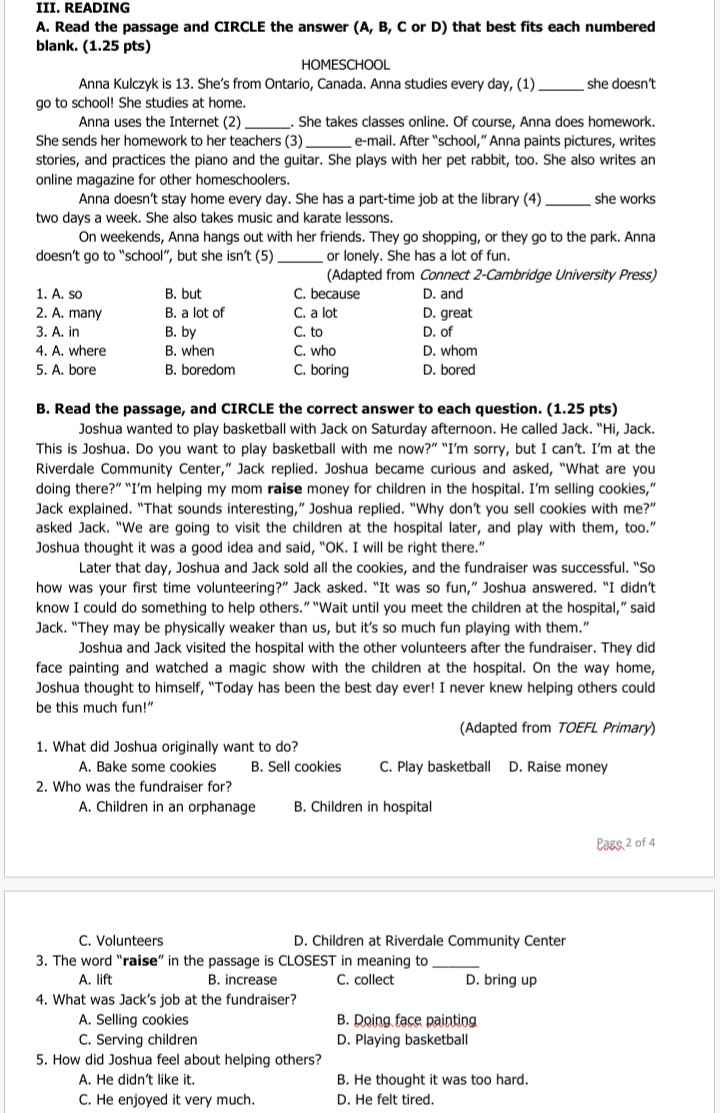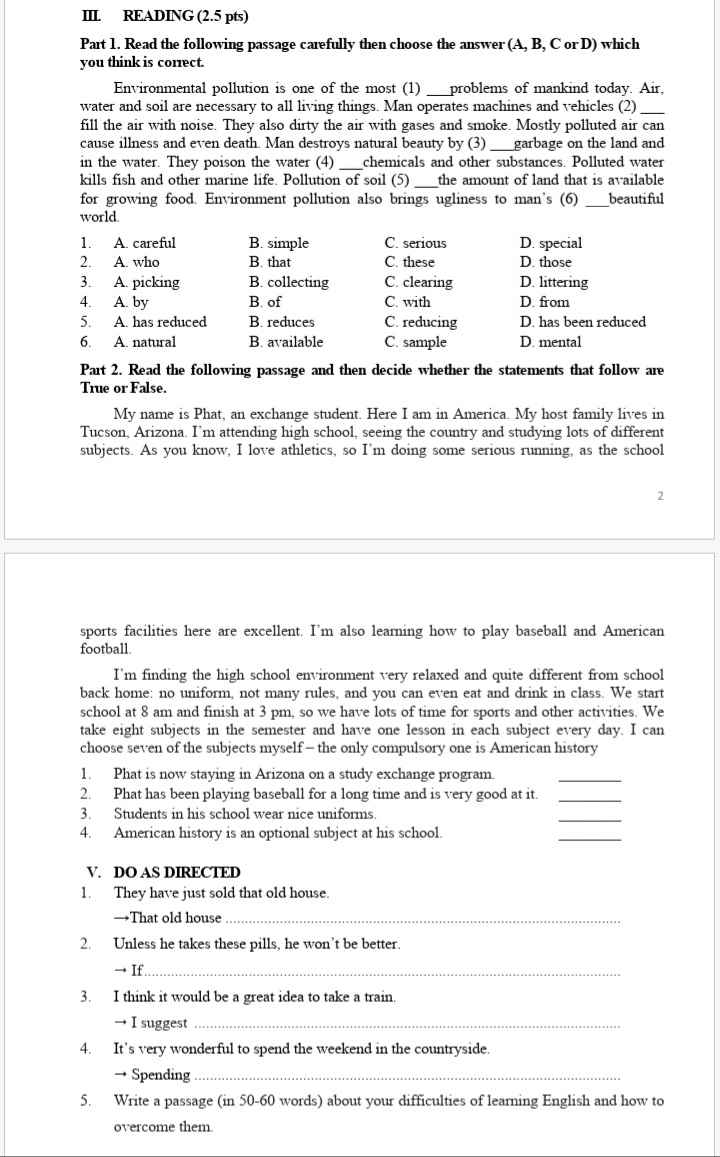Ôn thi vào 10
Các câu hỏi tương tự
BTVN Đảo ngữEx 3.Viết lại câu sao cho nghĩa không thay đổi.1. Her grief was so great that she almost fainted.– So………………………………………….2. He got down to writing the letter as soon as he returned from his walk.– No sooner……………………………………………………..3. She had hardly begun to speak before people started interrupting her.– Hardly……………………………………………………………..4. I only realized what I had missed when they told me about it later.– Only when……………………………………………………5. You won’t find a more dedicated worker anywhere than M...
Đọc tiếp
BTVN Đảo ngữ
Ex 3.Viết lại câu sao cho nghĩa không thay đổi.
1. Her grief was so great that she almost fainted.
–> So………………………………………….
2. He got down to writing the letter as soon as he returned from his walk.
–> No sooner……………………………………………………..
3. She had hardly begun to speak before people started interrupting her.
–> Hardly……………………………………………………………..
4. I only realized what I had missed when they told me about it later.
–> Only when……………………………………………………
5. You won’t find a more dedicated worker anywhere than Mrs John.
–> Nowhere…………………………………………..
6. The outcome of the election was never in doubt.
–> At no time…………………………………….
7. He forgot about the gun until he got home.
–> Not until………………………………
8. The only way you can become a good athlete is by training hard everyday.
–> Only by…………………………………………………………
9. He spent all his money. He even borrowed some from me. -> Not only…………………………………………………………
10. He had hardly left the office when the telephone rang. -> No sooner…………………………………………………………
11. I had only just put the phone down when the boss rang back. -> Hardly …………………………………………………………
12. He didn’t finish his work until the bell rang. -> Not until …………………………………………………………
13. We only began to see the symptoms of the disease after several months. -> Only …………………………………………………………
14. I have never seen anyone in my life drink as much as you. -> Never …………………………………………………………
15. A sleeping dog was lying under the table. -> Under the table …………………………………………………………
16. His brother had rarely been more excited. -> Rarely…………………………………………………………
17. The facts were not all made public until later. -> Only …………………………………………………………
18. If I had realized what would happen, I wouldn’t have accepted the job. -> Had…………………………………………………………
19. The response to our appeal was so great that we has to take on more staff.
-> So …………………………………………………………
20. Some children are playing happily on the field.
-> Playing ………………………………………………
Mọi người làm và giải thích ra hộ em nhé em xin cảm ơn ạ
Even when his reputation was in eclipse, almost everyone ________ that he had genius.
A. was willing to admit
B. denied vehemently
C. refused to acknowledge
D. swore on a stack of Bibles
Mọi người làm và giải thích ra hộ em nhé em xin cảm ơn ạ
Even when his reputation was in eclipse, almost everyone ________ that he had genius.
A. was willing to admit
B. denied vehemently
C. refused to acknowledge
D. swore on a stack of Bibles
m.n giúp mình với nha mình cần gấp lắm He took it ………………… granted that it was not his duty to do the housework. A.for B.with C.at D.in I’m exhausted …………………all the hard work of the past week. A. with B. At C. For D. from I was taken ………………… when I received the electric bill. A.over B.to C.in D.aback We stayed at home because Chris wasn’t keen ………………… going out. A.of B.for C.on D.with ………………… he was leaving, he told us that he had to go to the bank. A.After B.Since C.Until D.As Her parents died w...
Đọc tiếp
m.n giúp mình với nha mình cần gấp lắm He took it ………………… granted that it was not his duty to do the housework. A.for B.with C.at D.in I’m exhausted …………………all the hard work of the past week. A. with B. At C. For D. from I was taken ………………… when I received the electric bill. A.over B.to C.in D.aback We stayed at home because Chris wasn’t keen ………………… going out. A.of B.for C.on D.with ………………… he was leaving, he told us that he had to go to the bank. A.After B.Since C.Until D.As Her parents died when she was a child and she was ………………… by her grandparents. A.brought up B.taken in C.grown up D.looked for Mark got ………………… the bus when it stopped, then he walked into a café. A.out B.in C.on D.off The professor broke ………………… her lecture when she heard a cell phone ringing. A.off B.away C.in D.out These days everybody is aware ………………… the dangers of smoking. A.at B.about C.of D.with A few hour after the injection the feeling of numbness in your arm will ………………… A.drop away B.fall in C.wear off D.fade out Bài 2: Rewrite the sentences so that they are nearest in the meaning to the sentence printed before them. Example: Question: The last time we saw her was on Christmas Day. = We haven't ......... Correct answer: We haven't seen her since Christmas Day. 1. He didn't say goodbye to anyone when he left the room. = He left ................ 2. He left the house, but right after that it began to rain. = Hardly .......... 3. They find driving on the left difficult. = They aren't ............ 4. She's always nervous when she takes an exam. = Taking .......... 5. Lisa has always been mean with money, so she doesn't have many friends. = If Lisa ............. Bài 3: Read the passage below carefully and choose the correct answer. The computer age is producing an army of robots - machines that are directed by electronic brains and which replace human labor in industrial operations. Many are artificial arms which reach into areas man enters only at his peril, such as inside of a nuclear reactor. Already in 1980 there were over 8000 such robots working in industrial plants throughout the world. The big changeover to the robot, however, is likely to come only when their costs go down while workers' wages continue to rise. 1. A valuable use of many robots is to ............ . A. act as a teacher to human beings B. aid doctors in medical operations C. replace the human brain in producing computers D. do tasks extremely dangerous for human to do 2. The writer indicates that the widespread replacement of human labor by industrial robots .............. . A. is being delayed mainly for economic reasons B. has already begun C. will not take place before the end of this century D. is starting in the developing countries 3. In this passage, robots are used mainly ................ A. to take place of human workers B. to fight wars C. to direct electronic brains D. to operate computers 4. Which part of a human is the shape of many robots in use somewhat similar to? A. hand B. foot C. brain D. arm 5. Which of the following is certainly true? A. Robots are becoming cheaper than they used to be. B.The cost of a human worker is higher than that of the average robot. C. Robots are becoming more expensive all the time. D.The cost of the average robot is higher than that of a human worker. Giúp mình nhé cảm ơn các bạn nhiều <3
Your sister seldom cooks meals, _______________ ?
A. Did she B. Does she C. Doesn't she D. Didn't she
Gthich giùm mình luôn ạ
Mọi người giải giúp em bài này với ạ sẵn giải thích giùm em luôn ạ . Giải nhanh giúp em. Em cảm ơn. 
Mọi người giải giúp em đề này với ạ sẵn giải thích giùm em luôn ạ. Giải nhanh giúp em. Em cảm ơn. 
I- Choose the best answer:1. I cant reach the phone because I _____ a bath.A. am having B. have C. was having D. be having2. Dont turn off the light. I _____ a report now.A. read B. is reading C. am reading D. be reading3. He _____ his house at seven a.m each day.A. left B. leaves C. leave D. is leaving4. When she _____, I was reading upstairs.A. was coming B. is coming C. came D. comes5. My mother is cooking now. She always _____ dinner for my family.A. cooks B. cooked C. cooking D. is cooking6...
Đọc tiếp
I- Choose the best answer:
1. I can't reach the phone because I _____ a bath.
A. am having B. have C. was having D. be having
2. Don't turn off the light. I _____ a report now.
A. read B. is reading C. am reading D. be reading
3. He _____ his house at seven a.m each day.
A. left B. leaves C. leave D. is leaving
4. When she _____, I was reading upstairs.
A. was coming B. is coming C. came D. comes
5. My mother is cooking now. She always _____ dinner for my family.
A. cooks B. cooked C. cooking D. is cooking
6. I _____ in England for a few weeks now.
A. has been staying B. am staying C. have been staying D. stay
7. It _____ hard all day last Sunday.
A. rained B. was raining C. has rained D. has been raining
8. If he knew the facts, he _____ us what to do.
A. told B. will tell C. would tell D. tells
9. Let's hurry up! We must finish _____ the wall before ten o'clock this morning.
A. to paint B. painting C. paint D. painted
10. If you _____ work hard, you'll fail the exam.
A. not work B. don't work C. won't work D. work
11.I must say that my great passion in my life is _____.
A. studied B. to studying C. studying D. studies
12. He'd rather _____ books _____ watch TV.
A. read/ than B. read/ to C. reading/ to D. reading/ than
13. Would you mind _____ me to take these chairs away.
A. help B. to help C. helped D. helping
14. Mr. Kent has been out of _____ for a year.
A. a work B. the work C. work D. works
15. I am sorry I can't help you now. I'm busy _____ my lesson.
A. to B. X C. with D. for
16. She is very _____ up with doing the same thing everyday.
A. bored B. tied C. hate D. fed
17. she doesn't enjoy looking _____ the children.
A. for B. in C. after D. at
18. The long walk is tiring. We are very_____of the long walk
A. bored B. fed C. tired D. hated
19. His friends are surprised _____ his success.
A. in B. with C. at D. for
20. He was born _____ 2nd May 1987.
A. in B. on C. at D. since
This is the first time I (read) a novel (write) by an American novelist.
She wore a wig (avoid) (recognize).
Bill (have) breakfast when I (stop) by his house this morning.
She (learn) English at school, but she (forget) most of it now.
By the time he (return) next week, I’m sure we (finish) decorating our house.












